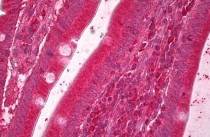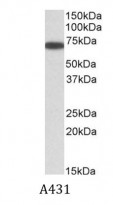ARG42132
anti-ERO1L antibody
anti-ERO1L antibody for IHC-Formalin-fixed paraffin-embedded sections,Western blot and Human
Overview
| Product Description | Goat Polyclonal antibody recognizes ERO1L |
|---|---|
| Tested Reactivity | Hu |
| Predict Reactivity | Ms, Rat, Cow, Dog, Pig |
| Tested Application | IHC-P, WB |
| Host | Goat |
| Clonality | Polyclonal |
| Isotype | IgG |
| Target Name | ERO1L |
| Antigen Species | Human |
| Immunogen | Synthetic peptide around the internal region of Human ERO1L. (C-QSDEVPDGIKSASY) (NP_055399.1) |
| Conjugation | Un-conjugated |
| Alternate Names | ERO1-like protein alpha; ERO1L; Endoplasmic oxidoreductin-1-like protein; ERO1-alpha; ERO1-L-alpha; Ero1alpha; Oxidoreductin-1-L-alpha; EC 1.8.4.-; ERO1LA; ERO1-L |
Application Instructions
| Application Suggestion |
|
||||||
|---|---|---|---|---|---|---|---|
| Application Note | WB: Recommend incubate at RT for 1h. IHC-P: Antigen Retrieval: Steam tissue section in Citrate buffer (pH 6.0). * The dilutions indicate recommended starting dilutions and the optimal dilutions or concentrations should be determined by the scientist. |
||||||
| Positive Control | A431 | ||||||
| Observed Size | ~ 70 kDa |
Properties
| Form | Liquid |
|---|---|
| Purification | Affinity purified |
| Buffer | Tris saline (pH 7.3), 0.02% Sodium azide and 0.5% BSA. |
| Preservative | 0.02% Sodium azide |
| Stabilizer | 0.5% BSA |
| Concentration | 0.5 mg/ml |
| Storage Instruction | For continuous use, store undiluted antibody at 2-8°C for up to a week. For long-term storage, aliquot and store at -20°C or below. Storage in frost free freezers is not recommended. Avoid repeated freeze/thaw cycles. Suggest spin the vial prior to opening. The antibody solution should be gently mixed before use. |
| Note | For laboratory research only, not for drug, diagnostic or other use. |
Bioinformation
| Database Links | |
|---|---|
| Gene Symbol | ERO1A |
| Gene Full Name | endoplasmic reticulum oxidoreductase alpha |
| Function | Oxidoreductase involved in disulfide bond formation in the endoplasmic reticulum. Efficiently reoxidizes P4HB/PDI, the enzyme catalyzing protein disulfide formation, in order to allow P4HB to sustain additional rounds of disulfide formation. Following P4HB reoxidation, passes its electrons to molecular oxygen via FAD, leading to the production of reactive oxygen species (ROS) in the cell. Required for the proper folding of immunoglobulins. Involved in the release of the unfolded cholera toxin from reduced P4HB/PDI in case of infection by V.cholerae, thereby playing a role in retrotranslocation of the toxin. Plays an important role in ER stress-induced, CHOP-dependent apoptosis by activating the inositol 1,4,5-trisphosphate receptor IP3R1. [UniProt] |
| Cellular Localization | Endoplasmic reticulum membrane; Peripheral membrane protein; Lumenal side. Note=The association with ERP44 is essential for its retention in the endoplasmic reticulum. [UniProt] |
| Calculated MW | 54 kDa |
| PTM | N-glycosylated. The Cys-94/Cys-99 and Cys-394/Cys-397 disulfide bonds constitute the redox-active center. The Cys-94/Cys-99 disulfide bond may accept electron from P4HB and funnel them to the active site disulfide Cys-394/Cys-397 (By similarity). The regulatory Cys-99/Cys-104 disulfide bond stabilizes the other regulatory bond Cys-94/Cys-131 (PubMed:23027870). [UniProt] |
Images (2) Click the Picture to Zoom In
-
ARG42132 anti-ERO1L antibody IHC-P image
Immunohistochemistry: Paraffin-embedded Human small intestine tissue. Antigen Retrieval: Steam tissue section in Citrate buffer (pH 6.0). The tissue section was stained with ARG42132 anti-ERO1L antibody at 5 µg/ml dilution followed by AP-staining.
-
ARG42132 anti-ERO1L antibody WB image
Western blot: 35 µg of A431 cell lysate (in RIPA buffer) stained with ARG42132 anti-ERO1L antibody at 0.3 µg/ml dilution and incubated at RT for 1 hour.







